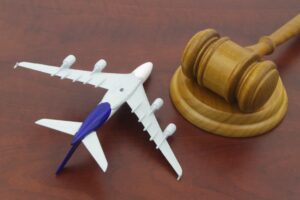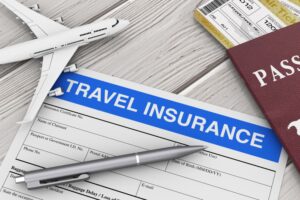Aviation accidents are terrifying. Afterward, you may be dealing with serious injuries, emotional distress, and confusion about what to do next. You must take the proper steps to protect your rights and increase your chances of receiving fair compensation for your losses.
This guide from an aviation accident attorney will walk you through the actions to take after an aviation crash, assuming you've already received medical attention for any injuries sustained.
Remember, every case is unique. The specific circumstances of your situation may require additional measures. However, these general steps can serve as a helpful roadmap during this challenging time.
Document Everything
Start by gathering and organizing all relevant information, including:
Your Flight Details
One of the first pieces of information to document after an aviation accident is the specifics of your flight. This includes:
- The airline you were traveling with
- The flight number
- The departure city and airport
- The scheduled arrival city and airport
- The actual date and time of the incident
Having these details readily available can help your attorney establish the facts surrounding the crash and identify the parties potentially responsible.
Witness Accounts

Eyewitness testimony can be valuable in an aviation accident case. It can provide independent accounts of what transpired during and leading up to the crash.
If possible, try to gather the names, contact information (phone numbers and email addresses), and any other relevant details about individuals who witnessed the accident firsthand. These witnesses can include:
- Fellow passengers
- Airport staff
- Bystanders on the ground who observed the incident
Medical Records
Medical records serve as objective evidence of the injuries you sustained and the treatment you received. Be sure to keep copies of all relevant medical documentation, including:
- Emergency room reports
- Hospital admission and discharge summaries
- Diagnostic test results (such as X-rays or MRI scans)
- Treatment plans
- Records of any surgeries or procedures performed
Expense Records
An aviation accident can result in a significant financial burden, ranging from medical bills and ongoing treatment expenses to lost income and property damage. Maintain detailed records of all expenses incurred as a direct result of the accident. Keep copies of medical invoices, receipts for prescription medications, travel expenses for medical appointments, and any other accident-related costs you've incurred. These records will help calculate your damages' full extent and ensure you receive fair compensation.
Avoid Speaking to Insurance Companies
After an aviation accident, the airline's insurance company representatives may contact you. While this may seem like a positive step towards resolving your case, use caution and avoid falling into potential traps set by these insurers.
One common tactic insurance companies use is requesting a recorded statement from you soon after the accident. They may present this as a routine procedure or claim that providing a statement is necessary to initiate the claims process. However, these statements can be used against you later, even if you unintentionally omit or misstate certain details due to the trauma and stress you've endured.

Another strategy insurance companies often use is to offer a quick settlement shortly after the accident. While the prospect of receiving a lump sum may seem appealing, especially if you're facing mounting medical bills and other expenses, these initial settlement offers are typically far lower than the true value of your claim.
Insurance companies train adjusters to minimize the amount they pay out. They may use several tactics to achieve this goal. For example, they might attempt to downplay the severity of your injuries or suggest that your actions contributed to the accident, thereby reducing the airline's liability.
These initial settlement offers rarely account for the full extent of your damages, including:
- Future medical expenses
- Lost income or earning potential
- Non-economic damages such as pain and suffering or emotional distress.
By accepting a lowball settlement offer too quickly, you can forfeit your right to pursue additional compensation that you may be entitled to as your damages become more apparent over time.
To protect your interests and ensure you receive fair and adequate compensation, avoid providing recorded statements or accepting settlement offers from insurance companies without consulting an experienced aviation accident attorney.
Seek Legal Representation From an Aviation Accident Lawyer
Aviation accident cases are highly complex, involving intricate legal procedures, extensive investigations, and negotiations with powerful corporations and their insurance carriers. Attempting to go through this process alone can be overwhelming. It may also jeopardize your ability to recover fair compensation.
Hiring a skilled aviation accident attorney is always advised. A lawyer can:
- Investigate the accident
- Gather evidence
- Calculate the full extent of your damages (including future medical expenses and lost income)
- Negotiate with insurance companies on your behalf
When selecting an attorney, look for one with a proven track record of success in aviation accident cases, strong negotiation skills, and a willingness to take your case to trial if necessary.
Understand the Relevant Laws and Statutes of Limitations
Federal and state laws and international treaties and regulations govern aviation accidents. Your attorney will support you, ensure you understand the specific laws and regulations that apply to your case, and ensure that you comply with all legal requirements.
One important consideration is the statute of limitations. This is the time frame you must file a lawsuit after an accident. Missing this deadline can result in losing your right to pursue compensation altogether.
Statutes of limitations vary depending on the jurisdiction and the circumstances of the case. It's wise to act quickly and seek legal counsel to avoid missing crucial deadlines.
Participate in the Investigation
After an aviation accident, the relevant authorities will likely conduct multiple investigations, such as the National Transportation Safety Board (NTSB), the Federal Aviation Administration (FAA), and the airline itself.
Your attorney can guide you through the investigation process, ensuring that your rights are protected and that you provide accurate and consistent statements. They may also conduct independent investigations, gathering evidence and professional testimony to support your case.
Consider All Potential Sources of Compensation
In aviation accident cases, there may be multiple parties potentially liable for your damages, including:
The Airline
As the flight operator, the airline is often a primary party held responsible in aviation accident cases.
Airlines must ensure the safety of their passengers, crew, and aircraft. Any negligence or failure to adhere to proper protocols and procedures can constitute grounds for liability. This can include issues such as:
- Inadequate pilot training
- Improper maintenance practices
- Failure to address known safety concerns
The Aircraft Manufacturer

In some cases, the root cause of an aviation accident may lie in a defect or flaw in the design or manufacturing of the aircraft itself.
Aircraft manufacturers are responsible for producing planes that meet strict safety standards and issuing appropriate warnings or recalls if they identify potential issues. If investigators find a manufacturing defect that contributed to the accident, the aircraft manufacturer can be liable for damages.
The Maintenance Company
Airlines often outsource maintenance and repair work to third-party companies, which must perform these tasks by industry standards and regulations. Suppose a maintenance company's negligence, such as failing to properly inspect or repair a critical component, is determined to be a contributing factor in the accident. In that case, the responsible party can be held liable.
Air Traffic Controllers
Air traffic controllers provide pilots with information and instructions regarding flight paths, altitudes, and potential hazards or conflicts. Suppose an air traffic controller's actions or inactions, such as issuing incorrect or confusing instructions, are found to have contributed to the aviation accident. In that case, they and the relevant air traffic control agency can be held accountable.
The Airport Authority
Airport authorities are responsible for designing, maintaining, and operating the airport facilities and infrastructure. This includes ensuring that runways, taxiways, and other surfaces are in proper condition and providing adequate lighting, signage, and navigational aids. If deficiencies or negligence on the part of the airport authority are determined to have played a role in the accident, they can be held liable.
Other Third Parties
Depending on the specific circumstances of the aviation accident, other third parties may be involved in the operation or maintenance of the aircraft, which can potentially be liable. This can include companies responsible for fueling, catering, or providing other services to the aircraft, as well as government agencies responsible for overseeing aviation safety regulations.
Your attorney will conduct a thorough investigation to identify all potentially liable parties and make sure to pursue all avenues for compensation.
Understand the Types of Damages You Can Claim

Aviation accident victims may be entitled to various types of damages, including:
Medical Expenses (Current and Future)
One of the most important forms of damage in an aviation accident case is the cost of medical treatment and care. This covers all your current medical bills and future expenses.
Depending on the severity of your injuries, you may require lengthy periods of physical therapy, medical equipment, or home modifications to accommodate disabilities, prescription medications, or even long-term care in a nursing facility. Your aviation accident attorney will work closely with medical professionals to accurately estimate the full scope of your future medical needs and associated costs and ensure that your compensation claim accounts for these expenses.
Lost Income and Diminished Earning Capacity
Injuries in an aviation accident can result in significant time away from work. This can lead to lost income and income. However, the financial impact may extend far beyond just the immediate loss of earnings. If your injuries have left you with permanent disabilities or limitations, the accident may diminish your ability to earn a living in the same capacity as before.
In such cases, you may be entitled to compensation for losing future earning potential, considering factors such as your age, education, skills, and projected career trajectory before the accident occurred. Your attorney will work with vocationalists and economic analysts to calculate the full extent of your lost income and diminished earning capacity, ensuring you receive fair compensation for these significant financial losses.
Pain and Suffering
Aviation accidents often result in severe physical injuries, ranging from broken bones and burns to traumatic brain injuries and spinal cord damage. The pain and suffering associated with these injuries can be immense, both in terms of the immediate physical agony and the long-term impact on your quality of life.
While it can be challenging to quantify the emotional and psychological toll of such trauma, your attorney will fight to ensure that you receive fair compensation for the pain and suffering you've endured. This may involve presenting compelling evidence, such as medical records, professional testimony, and personal accounts of how the injuries have affected your daily life.
Emotional Distress

In addition to physical injuries, aviation accidents can also inflict severe emotional and psychological distress on victims. The trauma of such an experience can lead to conditions like post-traumatic stress disorder (PTSD), anxiety, depression, and other mental health issues that can impact your well-being and quality of life.
Your attorney will work to document and present evidence of the emotional distress you've experienced, including records from mental health professionals, testimony from loved ones, and your accounts of the psychological impact of the accident. Compensation for emotional distress can help cover the costs of therapy, counseling, and other treatments necessary for your recovery and healing.
Loss of Enjoyment of Life
Severe injuries sustained in an aviation accident can rob victims of their ability to participate in activities and hobbies they once enjoyed. This loss of enjoyment can be particularly devastating, as it can impact not only physical pursuits but also social and emotional well-being.
Your attorney will fight to ensure that you are compensated for this loss of enjoyment, taking into account the specific activities and aspects of your life that your injuries have impacted. This may involve presenting evidence of your lifestyle and interests before the accident and professional testimony on how your injuries have affected your ability to engage in these activities moving forward.
Punitive Damages
In cases where particularly egregious or willful misconduct caused the aviation accident, such as gross negligence or intentional disregard for safety regulations, you may be entitled to pursue punitive and compensatory damages.
Punitive damages punish the responsible parties for their reckless or malicious behavior. They serve as a deterrent against similar actions in the future. Typically, the court awards these damages at its discretion. They can result in significant financial penalties for the liable parties.
Your aviation accident attorney will investigate the accident's circumstances and present compelling evidence of any willful or grossly negligent conduct that may warrant the pursuit of punitive damages.
Be Prepared for a Lengthy Process
Aviation accident cases can take months or even years to resolve. Insurance companies and other parties involved may delay or undermine your case, hoping you'll become frustrated and accept a lowball settlement offer.
Stay patient and persistent throughout the process, following your attorney's guidance and trusting their experience. While the journey may be long, having a skilled legal advocate by your side can increase your chances of achieving a favorable outcome.
Contact an Aviation Accident Lawyer

If you or a loved one experienced an aviation accident, don't hesitate to seek legal representation from an experienced personal injury attorneys. Reach out today to schedule a consultation and learn more about your legal options.